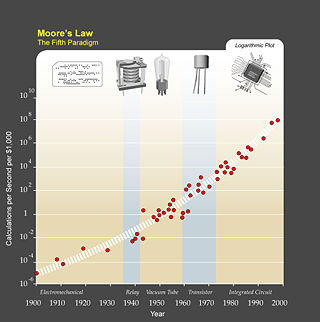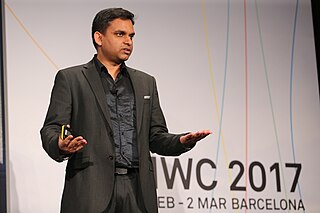
Raymond Kurzweil is an American computer scientist, author, entrepreneur, futurist, and inventor. He is involved in fields such as optical character recognition (OCR), text-to-speech synthesis, speech recognition technology and electronic keyboard instruments. He has written books on health technology, artificial intelligence (AI), transhumanism, the technological singularity, and futurism. Kurzweil is a public advocate for the futurist and transhumanist movements and gives public talks to share his optimistic outlook on life extension technologies and the future of nanotechnology, robotics, and biotechnology.

Patrick J. Michaels was an American agricultural climatologist. Michaels was a senior fellow in environmental studies at the Cato Institute until 2019. Until 2007, he was research professor of environmental sciences at the University of Virginia, where he had worked from 1980.

Clayton Magleby Christensen was an American academic and business consultant who developed the theory of "disruptive innovation", which has been called the most influential business idea of the early 21st century. Christensen introduced "disruption" in his 1997 book The Innovator's Dilemma, and it led The Economist to term him "the most influential management thinker of his time." He served as the Kim B. Clark Professor of Business Administration at the Harvard Business School (HBS), and was also a leader and writer in the Church of Jesus Christ of Latter-day Saints. He was one of the founders of the Jobs to Be Done development methodology.
Willis W. Harman was an American engineer, futurist, and author associated with the human potential movement. He was convinced that late industrial civilization faced a period of major cultural crisis which called for a profound transformation of human consciousness. Over a career lasting some four decades, he worked to raise public awareness on the subject through his writings and to foster relevant research through the nonprofit research institute SRI International, the Institute of Noetic Sciences (IONS), and the World Business Academy (WBA). He served as president of IONS for two decades, and he was a cofounder of the WBA. His many books include volumes coauthored with the futurist Howard Rheingold, who put forward similar views, and the mythologist Joseph Campbell.
Futurists are people whose specialty or interest is futurology or the attempt to systematically explore predictions and possibilities about the future and how they can emerge from the present, whether that of human society in particular or of life on Earth in general.

PA Consulting Group is a professional services firm that works with public, private and third-sector organisations. It was founded in 1943 by Ernest E. Butten, Tom H. Kirkham and Dr David Seymour, who used a new approach to people management to increase productivity in munitions factories during World War 2. PA grew to become the world’s largest management consultancy by headcount in 1970.

Futures studies, futures research, futurism research, futurism, or futurology is the systematic, interdisciplinary and holistic study of social/technological advancement, and other environmental trends; often for the purpose of exploring how people will live and work in the future. Predictive techniques, such as forecasting, can be applied, but contemporary futures studies scholars emphasize the importance of systematically exploring alternatives. In general, it can be considered as a branch of the social sciences and an extension to the field of history. Futures studies seeks to understand what is likely to continue and what could plausibly change. Part of the discipline thus seeks a systematic and pattern-based understanding of past and present, and to explore the possibility of future events and trends.
In futurology, especially in Europe, the term foresight has become widely used to describe activities such as:

Peter Schwartz is an American business executive, futurist, author, and co-founder of the Global Business Network (GBN), a corporate strategy firm, specializing in future-think and scenario planning. In 2011, Schwartz became an executive at Salesforce.com, where his roles include Senior Vice President of Strategic Planning and Chief Futures Officer.

James Packard Love is the director of Knowledge Ecology International, formerly known as the Consumer Project on Technology, a non-governmental organization with offices in Washington, D.C., and Geneva, that works mainly on matters concerning knowledge management and governance, including intellectual property policy and practice and innovation policy, particularly as they relate to health care and access to knowledge.

Stephen John Chalke is a British Baptist minister, the founder of the Oasis Charitable Trust, a former United Nations' Special Adviser on Human Trafficking and a social activist.
The World Future Society (WFS), founded in 1966, is an international community of futurists and future thinkers.

John Elkington is an author, advisor and serial entrepreneur. He is an authority on corporate responsibility and sustainable development. He has written and co-authored 20 books, including the Green Consumer Guide, Cannibals with Forks: The Triple Bottom Line of 21st Century Business, The Power of Unreasonable People: How Social Entrepreneurs Create Markets That Change the World, and The Breakthrough Challenge: 10 Ways to Connect Tomorrow's Profits with Tomorrow's Bottom Line.
The Institute for Business Value (IBV) a calibrated concept of IBM - is a business research organization that focuses on managerial and economic issues faced by companies and governments around the world. It has offices in China, India, Ireland, Japan, the Netherlands, South Africa and the United States, and it publishes between 35 and 50 major studies each year.
The Space Innovation and Growth Team was a joint initiative among the United Kingdom government, academia and the country's space industry. Its goal was to define a 20-year vision and strategy for the future growth of the UK space industry, which was published in February 2010 as the Space Innovation and Growth Strategy (IGS).
The following outline is provided as an overview of and topical guide to futures studies:

Richard Watson is an English author, lecturer and futurist known for his 2007 book Future Files: a Brief History of The Next 50 Years and for his infographics, especially his Trends & Technology Timeline 2010-2050 and his Table of Disruptive Technologies.

Jamais Cascio is a San Francisco Bay Area–based author and futurist.

Sangeet Paul Choudary is a business executive, advisor, and best-selling author. He is best known for his work on platform economics and network effects. He is the co-author of the international best-selling book Platform Revolution: How Networked Markets Are Transforming the Economy and How to Make Them Work for You.
Andy Hines is an American futurist, head of graduate studies in Foresight at the University of Houston, and author of several books on strategic foresight. Hines is a professional futurist, co-creator of the framework foresight method, Assistant Professor and Program Coordinator of the Graduate Program in Foresight at the University of Houston, Principal of foresight consulting firm Hinesight, and former organizational futurist at Kellogg Company and Dow Chemical. He has written extensively on futures studies, strategic foresight, foresight research methods, the role of organizational futurists, and the consumer landscape.












